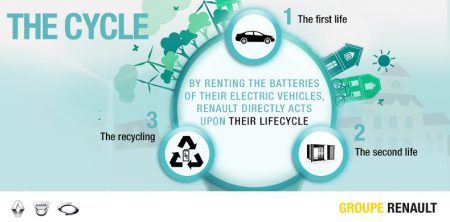Renault pioneered the development of electric vehicles in Europe, and leads the European electric vehicle market today. The vehicle batteries are rented to customers, and have been since release of Renault’s very first electric vehicle. In this way, Renault keeps full control over the whole battery lifecycle, which is advantageous not only to customers but to the planet as well.
Renault was the first European automaker to believe in the all-electric vehicle. Back in 2009, Carlos Ghosn announced a strategy that was ambitious and unprecedented on the market: Groupe Renault would be offering a full range of affordable all-electric vehicles by 2012. The promise was kept, with release of a line-up of electric vehicles addressing a broad customer spectrum: ZOE, Kangoo ZE and Twizy, plus Master ZE later this year in Europe, and RSM SM3 ZE in Korea.

Circular economy and battery lifecycle
Some 93% of Renault’s electric vehicle customers rent the batteries that power their cars. Because Renault owns the batteries, it can optimize both the usage and the end-of-life phases in the battery lifecycle.
Renault electric vehicle batteries are managed to a three-stage circular-economy approach:

1) Optimum battery life in the car
Renault monitors the battery condition in real-time and can therefore ensure an optimum battery lifespan at the on-the-road phase.
Renault repair centres can also repair defective batteries in the vast majority of instances. And any batteries that do prove irreparable for in-vehicle use continue active service in stationary energy storage applications.
2) Battery reuse off the road
3) Battery recycling
Renault implements a specific recycling process and works on improving its materials recovery practices, with partners such as Veolia.
Recycling starts with removing the battery’s cells (the electrochemical elements that store energy). The other battery materials are either reused or recycled through conventional processes. The cells are processed by specialist Renault partners using a hydro-metallurgical process for recovering metals such as copper, cobalt, nickel and lithium.
Read more: Groupe Renault

One thought on “Renault optimizes the lifecycle of its electric vehicle batteries”